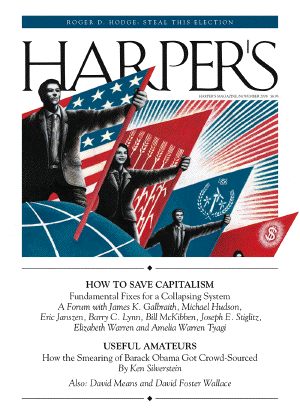 |
November 06, 2008 (Peter Foster, Financial Post)
As Barack Obama climbs that steep learning curve on the economy, let's hope aides of shielded him from the latest issue of Harper's. A series of articles on "How to Save Capitalism" in the latest edition of the magazine invites as much skepticism as would, say, a series on "How to Save Communism" in The Wall Street Journal. Still, at least it amounts to some kind of acknowledgment that capitalism is here to stay, even if Harper's ideas of salvation would be toxic.
The reflexive liberal reaction to the current financial crisis has been to recommend lots of new regulations without considering either whether these regulations are now necessary, or bothering to reflect on why regulatory regimes have failed so conspicuously in the past.
In its introduction, the magazine displays its misapprehension of the issue at hand by suggesting that "capitalists" have done a bad job of meeting their "responsibility" to save capitalism. However, as my colleague Terence Corcoran noted on this page earlier this week, capitalists are often the very last people who should be relied upon to defend capitalism. Neither is it the job of "eminent financiers" to "protect us from economic shocks." Meanwhile the "masters of our economy" identified by the magazine are not capitalists but politicians and bureaucrats, thus what has arguably been undermined is not the case for capitalism, but the case for "economic security."
Such a way of thinking, however, is beyond most of Harper's contributors, with the sole exception of Eric Janszen, a businessman, who identifies the key role of the government in promoting bubbles, and is the single correspondent who even acknowledges the existence of Fannie Mae and Freddie Mac. Mr. Janszen wants to end subsidies to industrial dinosaurs such as the auto sector, and recommends the greater use of public-private partnerships! How did this guy get in here? more...
AntiSpin: The time for the niche we have carved out for ten years as non-fundamentalist libertarians has at last arrived.
America lacks the style and refinement of a European country and the wisdom of an Asian nation with centuries of continuous cultural development, but we used to at least be practical. That was our charm. We need to stop pretending to be bankers and rentiers and get back to being who we are, a nation of inventors and business people.
It's time for us to get back to our knitting. Read "Re-Industrialize" to learn more.


Comment